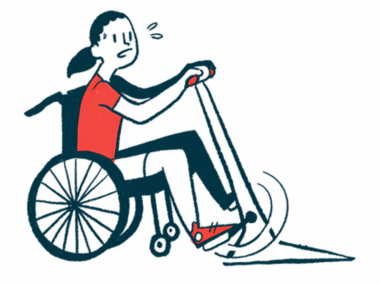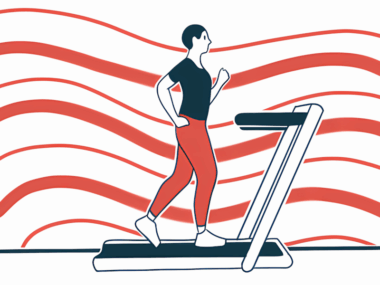Exergaming Shows ‘Superior’ Efficacy at Easing MS Symptoms in Trial
Written by |

A five-week, high-intensity video game-based exercise program called exergaming outperformed other forms of exercise at easing symptoms and improving life quality in people with multiple sclerosis (MS), a small trial found.
While all exercise programs slowed symptom worsening over two subsequent years of lower-intensity exercises, exergaming led to the greatest and most sustained gains.
“These data add to and complement the scant and mostly inconsistent long-term exercise data in MS,” the researchers wrote.
The study, “Comparative effectiveness of four exercise interventions followed by two years of exercise maintenance in multiple sclerosis: A randomized control trial,” was published in the journal Archives of Physical Medicine and Rehabilitation.
Ample evidence suggests that exercise programs lead to improved motor and cognitive abilities in people with MS. Exergaming — video games that involve active physical movement — is thought to be more motivating than other types of exercise, for reasons including complex and challenging tasks and immediate task feedback.
But few studies have directly compared the long-term benefits of different types of exercise, including exergaming, in a well-controlled setting.
Researchers in Hungary and the Netherlands conducted a randomized controlled trial (NCT04550650) comparing the effectiveness of three high-intensity exercise programs in people with MS — exergaming, cycling, and balance — with standard care. People in the two standard care groups were either given proprioceptive neuromuscular facilitation (PNF), a stretching technique used to improve range of motion, or physical therapy alone as a control group.
Overall, 70 people participated in the study. A majority (90%) were female, and most (62%) had relapsing-remitting MS. The mean age of participants was 47.
Each of the high-intensity exercise programs consisted of 25 hour-long sessions delivered by physical therapists over five weeks. Participants then continued with their assigned exercise for a two-year maintenance study phase involving three weekly one-hour sessions. Standard physical therapy consisted of two 30-minute sessions per week.
Participants were asked not to change their diet, medications, or other exercise habits for the study’s duration.
Its primary goal was to assess changes in the Multiple Sclerosis Impact Scale (MSIS-29), a self-reported questionnaire of the physical and psychological impacts of MS. Higher scores indicate a greater impact.
Exergaming led to the greatest improvements in MSIS-29 scores during the five weeks of high intensity training, results showed. Specifically, exergaming led to an 11 point improvement in MSIS-29, whereas balance and cycling led to six-point improvements. MSIS-29 scores were largely unchanged in the PNF and control groups.
Over the two-year maintenance phase, MSIS-29 scores decreased by an additional 15 points in the exergaming group, while scores in the balance and cycling groups returned to values similar to those at the study’s start. At the end of the maintenance phase, exergaming continued to outperform all other groups, with a total MSIS-29 score about 40 points better than the control group.
“The improved MSIS-29 scores reflect that [people with MS] perceived themselves more capable to walk, balance, and manipulate objects and felt an amelioration in clumsiness, stiffness, spasms, tremor, limb heaviness, and dependence on others,” the researchers wrote.
Exergaming and cycling also improved patients’ health-related quality of life, with exergaming outperforming the other groups after two years. Better fitness, mobility, and balance due to the exercise programs may underlie this improvement in life quality, the researchers suggested.
Indeed, all three high-intensity exercise programs led to significant improvements in walking capacity, measured with the six-minute walk test (6MWT), with greater gains compared to the control and PNF groups. Specifically, those in the exergaming group could walk 57 meters (187 feet) farther after the five-week program than they had at the study’s start, while those who cycled improved by 32 meters (105 feet) and those in the balance program improved by 19 meters (about 62 feet).
While all three groups at least maintained their gains during the maintenance phase, only those who used exergaming saw further improvements, with an additional 21 meter gain (69 feet). After two years, those in the exergaming group could walk 98 meters (about 321 feet) farther than those in the control group.
“Increases in walking ability are especially encouraging because of all clinical symptoms, walking ability becomes most impaired during 10 years of MS, and slow gait can identify MS-specific dismobility beyond natural aging,” the researchers wrote.
Exergaming also led to the most significant and sustained gains in gait and balance, as measured by the Tinetti Assessment Tool and the Berg Balance Scale.
These findings suggest that while all the exercise programs were able to slow symptom worsening, outperforming the control group, exergaming led to the greatest and most sustained improvements in MS symptoms and life quality.
“The superior efficacy of [exergaming] compared with [balance], [cycling], and PNF may rests in the complex sensorimotor stimulus, which can simultaneously address multi-faceted dysfunctions of MS, including balance, fall risk, postural control, and fitness,” the researchers concluded.
“These data are important, as it lends support for [people with MS] becoming engaged not only in exercise in general but in high-intensity exercise in particular,” they added.



